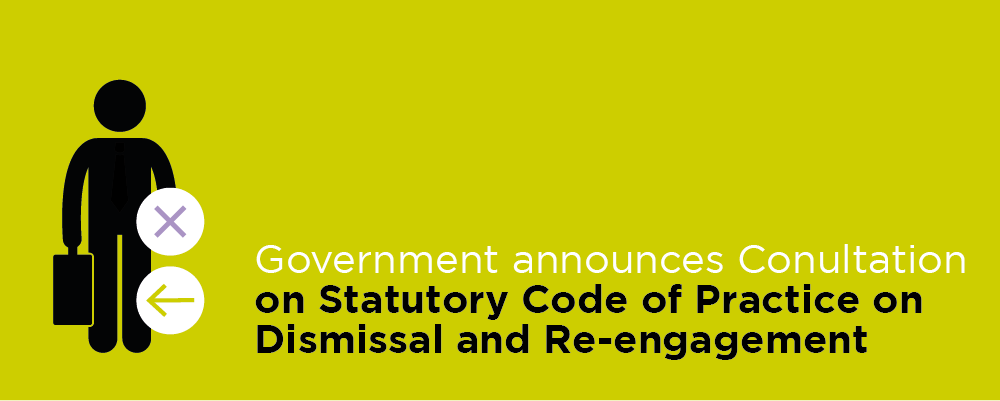- Basildon 01268244144
- Chelmsford 01245453800
- Colchester 01206217300
- London 020 4586 1280
Government announces Consultation on Statutory Code of Practice on Dismissal and Re-engagement

- Posted
- AuthorRianna Billington Purvis

In 2021, the Government asked ACAS to investigate the use of so-called “fire and rehire” practices. If you are not familiar, “fire and rehire” or dismissal and re-engagement is the practice of forcing acceptance of terms and conditions by terminating an employee’s employment and then immediately re-engaging them on the new terms.
In response to the Government’s request, ACAS published guidance on the practice, which I wrote a blog about here: New Acas guidance on fire and rehire practices- Birkett Long Solicitors. In essence, the guidance advised that “fire and rehire” is an extreme step that can damage staff morale and working relations, and should only be used as a last resort.
Despite the above guidance being produced, fire and rehire practices were still causing concern and high profile cases such as P&O Ferries dismissing 800 of their employees and the High Court granting an injunction against Tesco to prevent them from “firing and rehiring”, dominated the news.
In the wake of these instances, the Government announced on 29 March 2022 that a new Statutory Code of Practice Dismissal and Re-engagement (the Code) would be published on the use of dismissal and re-engagement to bring about unilateral changes to employees' terms and conditions. It was proposed that the Code would set standards for businesses to hold fair, transparent and meaningful consultations on proposed changes to employment terms and conditions.
Consultation – scope and objectives of the Code
On 24 January 2023, the Government published the draft Code and launched a consultation seeking views on it. The Code is based upon the ACAS advice but will be issued as a statutory code of practice, meaning that there will be financial consequences where an employer has failed to take the Code into account, with courts and tribunals having the power to apply an uplift of up to 25% of the compensation awarded in a relevant claim (listed in Schedule A2 to TULCRA 1992).
The Code is designed to ensure that an employer takes all reasonable steps to avoid fire and rehire and engages in meaningful consultation to obtain mutual agreement to any changes being considered. An employer should not use threats of dismissal to put undue pressure on employees to accept new terms instead of seeking to find an agreed solution. However, the government acknowledges that there are some situations in which dismissal and re-engagement can play a valid role as businesses may need the flexibility to use this option to save as many jobs as possible. In that regard, the Code attempts to strike a balance between labour market flexibility and worker protections.
It is important to note that the Code does not apply where an employee is dismissed because there is a genuine redundancy situation, but it will apply where the following conditions are met:
An employer considers that it wants to make changes to its employees' contracts of employment.
The employer envisages that, if the employees do not agree to those changes, it might dismiss them and either offer them re-employment on those new terms or engage new employees or workers to perform the relevant roles on the new terms.
In addition, employers will not be able to circumvent the Code by dismissing staff and engaging new hires who are prepared to work under less favourable conditions as the Code will apply regardless of whether the roles are filled by existing staff or new hires.
The consultation is due to remain open until 18 April 2023 and the Code will be brought into force when “parliamentary time allows”. If you wish to provide your thoughts, you can do so here: Draft Code of Practice on Dismissal and Re-engagement - Department for Business, Energy and Industrial Strategy - Citizen Space
Key takeaways for employers and employees
The Code is likely to reflect what many already see as good employee relations practice However given the statutory nature of the Code and power of tribunals to apply a 25% uplift to compensation in a relevant claim, it is likely to make employers think more carefully about the procedures they adopt before imposing any contractual changes and at the very least, employers should factor in the possibility of having to pay higher compensation when deciding whether to press ahead with any changes.
The introduction of the Code is likely to be warmly welcomed by employees, as it seeks to protect them from being subject to such practices and encourages employers to engage in meaningful and transparent consultation which has many benefits. Employees should be aware however that the Code also allows tribunals to reduce compensation by up to 25% where an employee has unreasonably failed to comply with it, but this scenario is perhaps less likely to arise in practice.
At present, the Code is still in draft form and may be subject to changes following the Consultation. We will keep you updated on this as and when more information comes through.
In the meantime and whilst we await the implementation of the Code if you are an employer who needs assistance with changing an employee’s terms and conditions or you are an employee whose terms and conditions are being changed, we would be very pleased to hear from you.
You can contact me directly via email rianna.billington@birkettlong.co.uk or call 01245 453812.


Comments